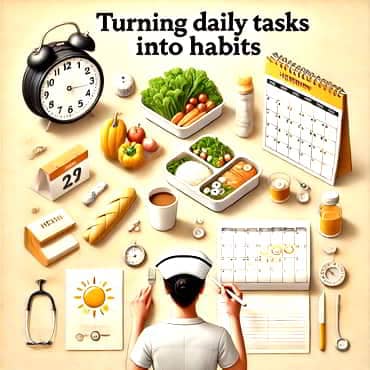Simplify To Maximise Productivity

Estimated reading time: 7 Min
Less can be more. Discover how simplifying your processes, tools, and priorities can lead to smarter action and less overwhelm.
My definition of quality is “conformance to requirements.”
“Keep things as simple as possible but no simpler” – Albert Einstein
When you think about it, Albert Einstein’s comment implies a focus on quality.
Keeping things simple can be surprisingly effective.
I used to think that managing a busy life required a complex system.
Back in the day, when I was a corporate employee, an active windsurfing competitor, a gigging musician, chairman of a water sports festival, and running safety and rescue boat handling courses, life was hectic.
I tried a number of ideas to get things done under control.
This was before the internet became a thing, and my attempts to meet my commitments were based on multiple methods for managing time.
But I was wrong.
Simplifying my approach dramatically improved my productivity.
Over time and with evolved technology, my simplifications have evolved too.
Here are five simplification strategies, sown as seeds about thirty-five years ago, that have flourished and help me stay focused, get more done, and still do today.
1. Complete At Least One High-Priority Task Each Day
To maximise productivity, choosing a single priority task to focus on each day.
It’s a game-changer.
A couple of years ago, I came across a book written in 2018 that I wish I’d written myself: “Make Time: How to Focus on What Matters Every Day” by Jake Knapp and John Zeratsky.
It’s well worth the investment—just £3.99 or so on Kindle!
The book covers this simple, yet powerful concept beautifully.
Choose one main task for the day that, if completed, would make you feel accomplished.
It fits perfectly with Stephen Covey’s premise that: “the key is not to prioritise what’s on your schedule, but to schedule your priorities.”
This approach ensures that even if you get nothing else done, you’ve achieved something significant.
It’s a simple tactic that keeps you focused on what truly matters.
I’ve used this strategy to great effect, whether it’s finishing a chapter of my book or preparing for an important meeting.
I get the highlight done, then often feel motivated to do more, and I always go to bed knowing I’ve accomplished something important that day.
The Eisenhower Matrix is one great way to simplify the prioritisation of what needs to get done.
“Most things which are urgent are not important, and most things which are important are not urgent.” Dwight D. Eisenhower
2. Schedule Blocks Of Time Instead of Tasks
Getting one priority done each day doesn’t stop my to-do list from increasing.
Long to-do lists can be overwhelming.
Although I still add all my tasks to a single list (some old habits die hard), to maximise productivity I categorise tasks and schedule time blocks for the different categories.
For example, I might have a block of time labelled “housekeeping” rather than listing every small chore.
This way, I’m not overwhelmed by the number of tasks and can focus on one type of work at a time.
Every day I have a couple of blocks labelled “Writing,” typically early morning and late afternoon when my creativity seems to be at its highest.
This method is not only more enjoyable but also more efficient.
It prevents the chaos of juggling too many tasks at once and helps me stay on track.
For larger tasks, like “finish writing xyz book,” I create separate events in my schedule.
This way, I find I can focus better.
Also, you will discover that this mindset fits perfectly with task batching in the next section.
3. Categorise and Batch Similar Tasks
When scheduling time blocks for tasks, it’s important to categorise them.
Group similar tasks together to maintain focus, efficiency and maximise productivity.
It’s commonly known as task-batching.
For example, printing documents and writing emails require different mindsets and are better done at different times.
When I was creating course schedules for teaching sailing-associated courses, I learned to outline lessons before I went to work in the morning, then fill out the details later, after work.
This prevented frequent switching between different types of work, allowing me to get into a flow state.
Applying this method now helps me enjoy my work more, regain time, and increase productivity.
4. Turn Daily Tasks into Habits
Daily tasks can become overwhelming unless they turn into habits.

Think of recurring tasks like checking email, replying to messages, or writing.
My wife, a nurse, always makes her own lunch the night before.
This habit saves her time in the morning and ensures the task is always done.
All habits start with discipline.
If you use discipline enough times, the activity will become a habit.
“Habit is more dependable. Habit will sustain you whether you’re inspired or not.” Octavia Butler
Creating habits for daily tasks, like setting specific times for emails and other communications, for example, frees up mental space for more important work.
This approach has allowed me to find time to write a post on my website every day.
Turning tasks into habits is a simplification tactic to maximise productivity in your daily routine.
5. Develop a System for Achieving Goals
Managing goals and projects with many moving parts requires a solid system.
Nowadays, I use Notion to organise everything from web clips, notes, to-do lists, workflows, and daily schedules and to maximise productivity.
I also keep an area for daily journaling that I call my “Meta Log.”
“You will never change your life until you change something you do daily.” — Unknown
Having a central system like Notion helps keep track of progress and manage multiple tasks efficiently.
Using a system-based approach helps me focus, without getting bogged down by my task list.
For anyone juggling various projects, a reliable system is essential for staying organised and productive.
FAQs: Simplify To Maximise Productivity
Why is it important to have a daily highlight?
Having a daily highlight ensures you focus on what’s most important each day. It helps you feel accomplished, even if you don’t get everything done. This simple strategy keeps your priorities clear and manageable and helps you maximise productivity.
How do I effectively schedule time instead of tasks?
Allocate specific time blocks for categories of tasks rather than individual tasks. For example, instead of listing every chore, create a time block called “housekeeping.” This approach prevents overwhelm and helps you stay focused on one type of work at a time.
What is the Eisenhower matrix, and how can it help me?
The Eisenhower matrix is a tool for prioritising tasks by urgency and importance. It divides tasks into four quadrants: urgent and important, important but not urgent, urgent but not important, and neither urgent nor important. This helps you focus on what truly matters and to maximise productivity.
How can I turn daily tasks into habits?
Identify tasks that need daily attention and schedule a consistent time for them. Stick to this routine until it becomes a habit. This frees up mental space and ensures these tasks get done without much effort.
What tools can I use to manage my projects?
Tools like Notion and Google Calendar are excellent for organising information, notes, tasks, workflows, and schedules. These tools centralise information and help you manage multiple projects efficiently.
Summary
Simplification is a key to maximise productivity.
By focusing on one main task each day, scheduling time blocks instead of individual tasks, categorising work, turning daily tasks into habits, and using a reliable system for managing projects, you can streamline your workflow and achieve more.
These simplification strategies help you stay organised, reduce stress, and make it easier to handle multiple responsibilities.
Here’s a bonus.
The older I get, the more I find it useful to boost focus.
I use the Pomodoro Technique a lot for this.
Embrace simplicity, and you’ll find yourself more productive and less overwhelmed.
Now, are you ready to boost your productivity.
Start by simplifying your life.
Implement these strategies today and experience the difference.
Thanks for visiting.
Please share your progress and tips in the comments below; let’s create a community of productivity enthusiasts!
😉
Richard
Useful Resources
Books:
- Make Time: How to Focus on What Matters Every Day, by Jake Knapp and John Zeratsky
- The 7 Habits of Highly Effective People by Stephen Covey
- The Pomodoro Technique, by Francesco Cirillo
Tools:
- Notion: A versatile tool for note-taking, task management, and project tracking.
- Google Calendar: Useful for scheduling and keeping track of appointments and deadlines.
- Productivity Planner: A planner designed to help prioritise tasks and focus on what’s important.
Articles and Blogs:
- Productivity tips and strategies from popular productivity blogs like Lifehacker and Zen Habits.
- Time management techniques from online articles on reputable sites like Harvard Business Review and Forbes.






